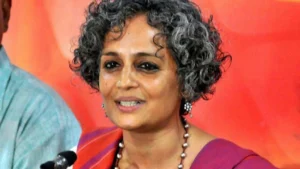Prosecution of novelist and campaigner Arundhati Roy: On June 16, while speaking to reporters during a joint press conference, in Mumbai, with Maha Vikas Aghadi allies Shiv Sena chief Uddhav Thackeray and senior Congress leader Prithviraj Chavan, on being asked about Delhi L-G VK Saxena’s sanction to prosecute Roy under the Unlawful Activities Act, or UA, for an address at an event 14 years ago NCP chief Sharad Pawar condemned the Delhi Lieutenant Governor’s decision to prosecute novelist Arundhati Roy under the severe UA (Unlawful Activities) for an alleged inflammatory speech in 2010 as “misuse of power”

Expressing disapproval of the prosecution, the National Conference (NC) stressed the need to uphold the fundamental right of every citizen to free speech as guaranteed by Article 19 of the Constitution.
“It is also imperative to note that this permission has been granted 14 long years after the alleged speech took place. In the intervening years the speech has been all but forgotten and didn’t vitiate the atmosphere in J&K,” it said.

He said this prosecution would serve no purpose except perhaps to show that the “hardline stance of the BJP/Union Government won’t change despite the electoral setback they recently faced”.
Delhi Lieutenant Governor VK Saxena, on June 15, gave nod to prosecute Arundhati Roy under the stringent anti-terror law, the Unlawful Activities (Prevention) Act (UAPA). The case was registered in 2010 for allegedly delivering provocative comments.

The FIR in the matter was registered on a complaint made by Sushil Pandit, a social activist from Kashmir, on October 28, 2010.
Arundhati Roy, a Booker Prize-winning author, and Hussain had been named in an FIR registered on October 28, 2010.
The two had allegedly made provocative speeches at a conference organized under the banner of ‘Azadi – The Only Way’ on October 21, 2010, in New Delhi.
Arundhati Roy’s reaction on prosecution
Roy, 61, won the Booker Prize for fiction in 1997. She is also an outspoken political and rights activist and regularly writes in Indian and foreign publications.
Arundhati Roy reacted to her prosecution by VK Singh Saxena by stating that she was not surprised and that the charges were baseless. She said she was ready for trial and that the allegations were a harassment attempt to silence her.
RT bcoz Godi Media will not show this. pic.twitter.com/LMDtILT1nx
— ✎𝒜 πundhati🌵🍉🇵🇸 (@Polytikles) June 15, 2024
PDP chief and former chief minister of the erstwhile state of J-K, Mehbooba Mufti, termed the prosecution of writer as “shocking”.

“Shocking that Arundhati Roy, world-renowned author and a brave woman who has emerged as a powerful voice against fascism, has been booked under the draconian UAPA,” she said on ‘X’.
The PDP chief said the Centre continues its “rampage violating fundamental rights with impunity”.
Those who were prosecuted under UAPA recently:
- The Unlawful Activities (Prevention) Act (UAPA) has been used to book various individuals and organizations.
- Between 2016 and 2020, 5,027 cases were registered under UAPA with 24,134 people accused. Only 212 were convicted, and 386 were acquitted, leaving the majority awaiting trial1.
- Groups like Lashkar-e-Taiba and Jaish-e-Mohammad, as well as individuals like Masood Azhar and Hafiz Saeed, have been designated as terrorists under UAPA
- Students from universities like JNU and Jamia Millia Islamia, activists, and even those using VPN in Kashmir have been booked under this law.
- For specific cases, like the seven Kashmiri students arrested for allegedly celebrating India’s loss in the World Cup 2023 final, they were charged under section 13 of UAPA.
How UAPA curbs Fundamental Rights?
- The UAPA has significant implications for civil liberties in India. It has been used to charge civil society organizations, activists, and journalists, particularly those advocating for marginalized communities or expressing dissent against government policies.
- Critics argue that it suppresses dissent through intimidation and harassment, threatening public debate, freedom of the press, and criminalizing civil liberties.
- The act empowers the government to restrict citizens’ rights and freedoms to protect the sovereignty and integrity of India.
- This has raised concerns about its constitutionality with regard to the right to protest and free speech. There are instances where it’s considered to be misused as a tool of terror against.
What is UAPA and provision of prosecution?
The Unlawful Activities Prevention Act (UAPA) is a legislative act passed in India in 1967 that aims to prevent and curb terrorist and unlawful activities in the country. It empowers the police to investigate and prevent such activities, and also provides for the detention of suspected individuals.
Under section 31 of the Prevention of Insurgency Act, 1967, made provisions for prosecution under the Unlawful Activities (Prevention) Act, 1967.










